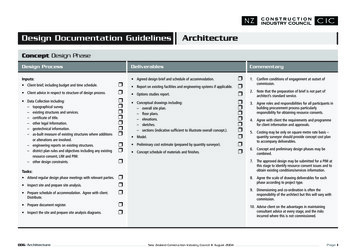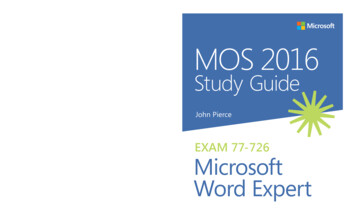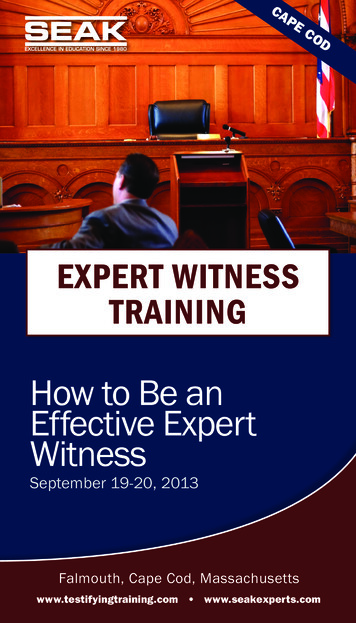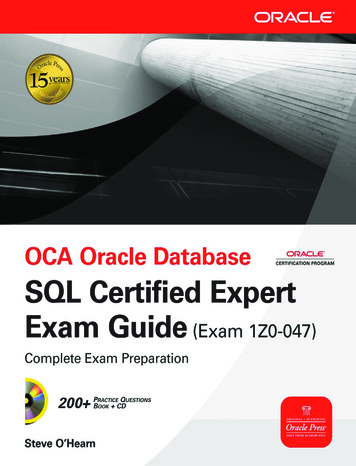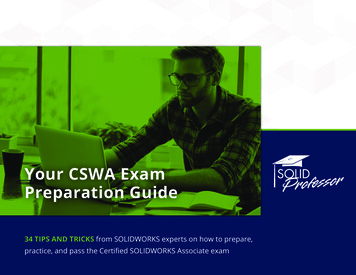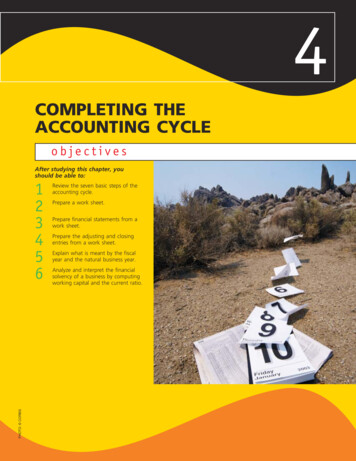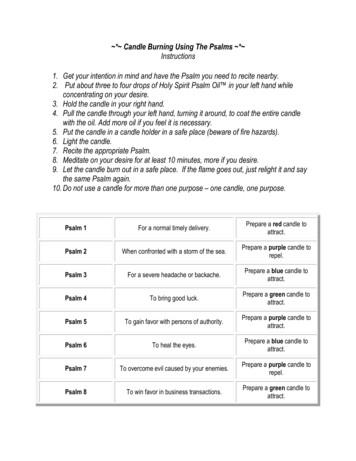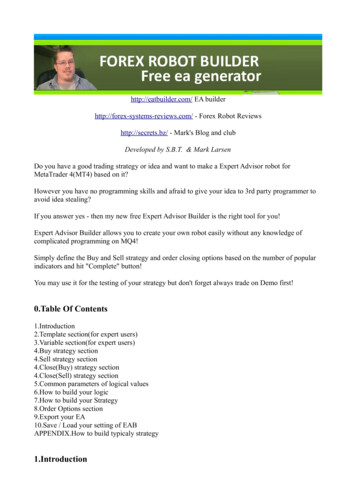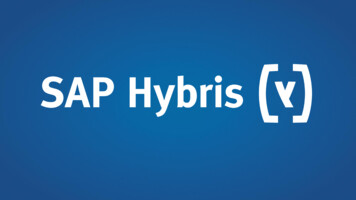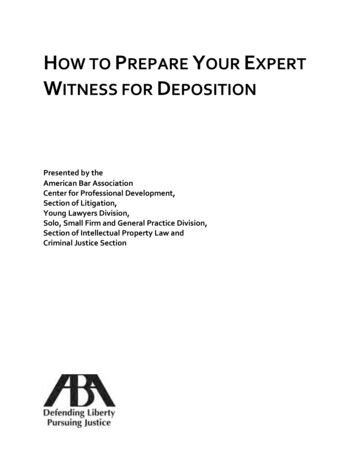
Transcription
HOW TO PREPARE YOUR EXPERTWITNESS FOR DEPOSITIONPresented by theAmerican Bar AssociationCenter for Professional Development,Section of Litigation,Young Lawyers Division,Solo, Small Firm and General Practice Division,Section of Intellectual Property Law andCriminal Justice Section
American Bar AssociationCenter for Professional Development321 North Clark Street, Suite 1900Chicago, IL 60654-7598www.americanbar.org800.285.2221CDs, DVDs, ONLINE COURSES, DOWNLOADS, and COURSE MATERIALSABA self-study products are offered in a variety of formats.Find our f our full range of options at www.ShopABA.orgDiscuss This Course OnlineVisit http://www.americanbar.org/groups/cle/course content/cle discussion boards.htmlto access the discussion board for this program.Discussion boards are organized by the date of the original program,which you can locate on the preceding page of these materials.The materials contained herein represent the opinions of the authors and editors and should not beconstrued to be the action of the American Bar Association Center for Professional Development,Section of Litigation, Young Lawyers Division, Solo, Small Firm and General Practice Division, Section ofIntellectual Property Law or Criminal Justice Section unless adopted pursuant to the bylaws of theAssociation.Nothing contained in this book is to be considered as the rendering of legal advice for specific cases, andreaders are responsible for obtaining such advice from their own legal counsel. This book and any formsand agreements herein are intended for educational and informational purposes only. 2013 American Bar Association. All rights reserved.This publication accompanies the audio program entitled “How to Prepare Your Expert Witness forDeposition” broadcast on January 10, 2013 (event code: CET3HPE).
TABLE OF CONTENTS1. Presentation Slides2. How to Prepare Your Expert Witness for DepositionJames J. Mangraviti, Jr., and Steven Babitsky3. Deposition Preparation OutlineJames J. Mangraviti, Jr., and Steven Babitsky
1
How to Prepare Your Expert Witness forDepositionBy Steven Babitsky, Esq. and James J. Mangraviti Jr., Esq.Thursday, January 10, 2013 1:00 PM EasternSponsored by the ABA Center for Professional Developmentwww.americanbar.org www.abacle.orgAbout the PresentersSteven Babitsky and James J. Mangraviti, Jr., Esq. have trainedthousands of expert witnesses through seminars, conferences,corporate training, and training for professional societies. Steve andJim are also frequently called to train and prepare individual expertwitnesses for upcoming testimony – either by the expert personally,the expert’s employer, or the expert’s retaining law firm. They havehelped expert witnesses and their attorneys prepare for deposition ina broad range of cases, including antitrust, patent, medicalmalpractice, wrongful death, computer forensics, and many others.They currently serve as Principals of SEAK, Inc.(www.testifyingtraining.com) - the expert witness training company.Steve and Jim are the authors of numerous books on expertwitnesses including How to Prepare Your Expert Witness forDeposition (SEAK 2012). In 2000 they founded SEAK’s NationalDirectory of Expert Witnesses (www.seakexperts.com), whichcontains over 1,300 expert witnesses.www.americanbar.org www.abacle.org1
Preparation of an Expert Witness for Deposition How your expert performs at deposition is likelyto have a critical, and sometimes dispositive,influence on the outcome of your case. How you prepare your expert may welldetermine how he/she performs. Preparation of your expert is within your controland is your responsibility as retaining counsel.www.americanbar.org www.abacle.orgPreparation of an Expert Witness for Deposition (Cont’d) Prepare your expert well and enjoy the rewards. Fail to prepare your expert and risk theconsequences. This webinar will provide you with a provenprotocol to effectively prepare your expertwitness for deposition.www.americanbar.org www.abacle.org2
Time spent on preparing your expert witness is usually a goodinvestment of your client’s money Many/most poor expert witness depositionscould have been prevented with properpreparation. Even well-seasoned experts should beprepared – never assume an experiencedexpert witness needs no preparationwww.americanbar.org www.abacle.orgIt can be helpful to obtain past deposition transcripts of yourexpert witness and opposing counsel Reviewing your expert’s deposition transcriptwill allow you to quickly identify pastperformance issues Issues could include:– Poor active listening.– Rambling on.– Interrupting the questioner.www.americanbar.org www.abacle.org3
It can be helpful to obtain past deposition transcripts of yourexpert witness and opposing counsel (Cont’d)– Getting outside of sandbox.– Responding to non-questions.– Failure to put a period down (e.g. “I don’t know, but ”). Reviewing past expert witness depositiontranscripts of opposing counsel will helpidentify style, approaches and questions likelyto be asked.www.americanbar.org www.abacle.orgSchedule the deposition for a favorable time and location Pick a time when your expert is likely to befresh and will have time to become wellprepared. Explain to your expert why it is ill-advised tohave the deposition in their own office– Informal discovery– Accessibility to records– Distractionwww.americanbar.org www.abacle.org4
Orient Your Expert Witness Go over housekeeping issues such asanticipated length, parking, dress, attorneyslikely to be present, whether the deposition willbe on video, and how the expert will be paid.www.americanbar.org www.abacle.orgOrient Your Expert Witness (Cont’d) Explain the basic legal rules of a deposition– Opposing counsel has tremendous leeway in askingquestions– The objections available to you as retaining counsel arelimited and in most instances your expert will still need toanswer the question, even if it has been objected to.– The rules of discoverability of expert witness-retainingcounsel communication in the jurisdiction in question.www.americanbar.org www.abacle.org5
Explain the likely goals of retaining counsel Size up your witness Lock your expert down into absolute answers Build a record to exclude your expert underDaubert, Frye, or Rule 702. Fish around for damaging information.www.americanbar.org www.abacle.orgProvide your expert with general advice Tell the truth. Actively listen.– “Do you know what time it is?”– Picture question as if written on white board. This is a deposition, they are not having afriendly conversation with opposing counsel. Their job is to answer the questions truthfullyand articulately. They should focus on the actual questionasked.www.americanbar.org www.abacle.org6
Provide your expert with general advice (Cont’d) Leave wiggle room where appropriate.– “Will you be offering any other opinions?”– “Did you discuss this case with anyone else?” The deposition is open book – if your expertneeds to look something up they should. If your expert doesn’t know or doesn’tremember, they should just say so.www.americanbar.org www.abacle.orgProvide your expert with general advice (Cont’d) Don’t have your expert answer anunintelligible or confusing question. Have your expert do their homework and bevery well prepared to answer key questionsusing headlines and bullet points.– Headline e.g. Opposing Expert’s Opinion is Incorrect, Iam Qualified to Opine, My Opinion is based on, etc.» Bullets are specific reasons supporting eachheadlinewww.americanbar.org www.abacle.org7
Identify areas of vulnerability for your expert witness Prepare for your expert witness a series of the10-20 issues they must be prepared toanswer questions on, truthfully andarticulately. Independently ask your expert to identifyadditional areas of concern.– The expert is often concerned with trivial matters– However, the expert’s concerns can bring importantinsights– Unresolved issues can and do become a distraction.www.americanbar.org www.abacle.orgConduct a mock deposition with your expertwww.americanbar.org www.abacle.org8
Explain to your expert how he should prepare on his own. Thisinvolves the following steps:1. Having a full, complete, and exhaustiveknowledge of the facts in the case, which willhelp:––––Your expert identify questions based on incorrect factsIdentify mischaracterizationsMake your expert more confidentYour expert make a favorable impression as a witnesswww.americanbar.org www.abacle.orgExplain to your expert how he should prepare on his own. Thisinvolves the following steps: (Cont’d)2. Review important dates such as:– when the expert was first contacted by counsel,– when the expert was retained,– when the records were received and from whom theywere received,– when the expert formed his opinion(s) in the case,– the date of the accident in question, and– the date(s) key tests were performed.www.americanbar.org www.abacle.org9
Explain to your expert how he should prepare on his own. Thisinvolves the following steps: (Cont’d)3. Knowing his CV cold.4. Possessing intimate and complete familiaritywith any reports or other documents that theexpert has authored or signed in the case aswell as any expert declarationwww.americanbar.org www.abacle.orgExplain to your expert how he should prepare on his own. Thisinvolves the following steps: (Cont’d)5. If the expert has not drafted a report, youshould go over the following with your expert:– Can the expert make and bring notes, timelines, etc. tothe deposition?– Can the excerpt highlight records or excerpt them andbring along?– Can and should the expert bring a list of the opinionsthey expect to be offering at the trial, along with theconcise reasons for the opinions?– What other aids, if any, can the expert bring to thedeposition?www.americanbar.org www.abacle.org10
Explain to your expert how he should prepare on his own. Thisinvolves the following steps: (Cont’d)6. Personally touching every piece of paper inthe file.7. Organizing the file oneself to allow quick andeasy access to information even while undergreat stress.www.americanbar.org www.abacle.orgExplain to your expert how he should prepare on his own. Thisinvolves the following steps: (Cont’d)8. Researching answers to common andexpected “money” questions:–––––Their hourly rate.How much they have billed to date.How much they are owed on the case to date.The % of their income that comes from legal matters.What % of their work is plaintiff v. defense.www.americanbar.org www.abacle.org11
Explain to your expert how he should prepare on his own. Thisinvolves the following steps: (Cont’d)9. Thinking of the most difficult questions thatcounsel might ask and being prepared totruthfully and artfully reply to them.10. Being able to express and defend each andevery opinion the expert has expressed inthe case.www.americanbar.org www.abacle.orgDemonstrate to your expert the deposition tactics they are likelyto face, such as:1.2.3.4.5.6.Catchall questionsFishing for contradictionsThe Wide Eyed StudentThe Silence GambitHypothetical QuestionsMagic Wordswww.americanbar.org www.abacle.org12
Demonstrate to your expert the deposition tactics they are likelyto face, such as: (Cont’d)7. Wearing Your Expert down8. Getting Your Expert into a rhythm9. Daubert set up10. Repetitive Questioning11. Button Pushingwww.americanbar.org www.abacle.orgMajor areas of concern to review with your expert: What he/she is an expert onWhat he/she will be offering opinions onWhat they will not be offering opinions onThe basis of the opinions to be offeredwww.americanbar.org www.abacle.org13
Major areas of concern to review with your expert: (Cont’d) The assumptions the opinions are based onWording of opinionsUnderstanding of legalese and magic wordsAreas the expert is concerned aboutwww.americanbar.org www.abacle.orgShow your expert techniques for how toappear confident and make a positiveimpression on camerawww.americanbar.org www.abacle.org14
Expose your expert to trick and difficult questions such as: What exactly are you an expert in?Is your opinion engraved in stone?What is your margin of error?Did you do your best work on this case?What are the weakest parts of your case?How do you define “reasonable degree ofcertainty?” Will you be expressing any other opinions attrial?www.americanbar.org www.abacle.orgExpose your expert to trick and difficult questions such as:(Cont’d) When did you first form your opinion? Is your opinion subjective? Have you done everything necessary to giveme your full and final opinions? Is opposing expert a recognized expert inyour field? Are you nervous? Do you keep current with the literature in yourfield? Is your CV current, accurate, and complete?www.americanbar.org www.abacle.org15
Case Examples SmirkerNot as qualified asNo relevant experienceGuestimateEvidence-basedStandard of care 6 million dollar manwww.americanbar.org www.abacle.orgQuestions?Thank youSteven Babitsky, Esq.stevenbabitsky@seak.com508-548-9443James Mangraviti Jr., Esq.jim@seak.com978-276-1234www.americanbar.org www.abacle.org16
2
How to Prepare Your ExpertWitness for DepositionExecutive Summary1Overview of Expert Witness Deposition PreparationThe authors recommend the following regarding preparing your expert witnesses for deposition:Time spent on preparing your expert witness is usually a good investment of your client’smoney.oMany/most poor expert witness depositions could have been prevented with properpreparation.oEven well-seasoned experts should be prepared. Never assume an experienced expertwitness needs no preparation.It can be helpful to obtain past deposition transcripts of your expert witness and ofopposing counsel.oReviewing your expert’s deposition transcript will allow you to quickly identify pastperformance issues.oReviewing past expert witness deposition transcripts of opposing counsel will helpidentify style, approaches, and questions likely to be asked.Schedule the deposition for a favorable time and location.oChoose a time when your expert is likely to be fresh and will have time to prepare.oExplain why it is ill-advised to have the deposition in one’s own office.Orient your expert witness.oGo over housekeeping issues such as anticipated length, parking, dress, attorneyslikely to be present, whether the deposition will be on video, and how the expert willbe paid.oExplain the basic legal rules of a deposition. Opposing counsel has tremendous leeway in asking questions. The objections available to you as retaining counsel are limited and, in mostinstances, your expert will still need to answer the question, even if it has beenobjected to. The rules of discoverability of expert witness-retaining counsel communication inthe jurisdiction in question.Explain the likely goals of opposing counsel.oSize up your witness.oLock your expert down into absolute answers.oBuild a record to exclude your expert under Daubert, Frye, or Rule 702.oFish around for damaging information.1Reprinted with permission from Mangraviti JJ and Babitsky S, How to Prepare Your Expert Witness forDeposition (SEAK 2012).How to Prepare Your Expert Witness for DepositionBy James J. Mangraviti, Jr. Esq. and Steven Babitsky, Esq.Page 1
Provide your expert with general advice.oTell the truth.oActively listen.oThis is a deposition. It is not a friendly conversation with opposing counsel.oTheir job is to answer the questions truthfully and articulately.oThey should focus on the actual question asked.oThe deposition is open book. Your expert can look things up.oIf your expert doesn’t know or doesn’t remember, she should just say so.oDon’t answer an unintelligible or confusing question.oThe expert should do her homework and be prepared to answer key questions usingheadlines and bullet points.Identify areas of vulnerability for your expert witness.oCreate a series of the 10–20 issues your expert must be prepared to answer questionson truthfully and articulately.Independently ask your expert to identify additional areas of concern.Conduct a mock deposition with your expert.Explain to your expert how he should prepare on his own. This involves the followingsteps:oHaving a full, complete, and exhaustive knowledge of the facts in the case. This willhelp your expert: Identify questions based on incorrect facts, Identify mischaracterizations, Be more confident, and Make a favorable impression as a witness.oReview important dates, such as: When the expert was first contacted by counsel, When the expert was retained, When the records were received and from whom they were received, When the expert formed his opinion(s) in the case, The date of the accident in question, and The date(s) key tests were performed.oKnowing his CV cold.oPossessing intimate and complete familiarity with any reports or other documents thatthe expert has authored or signed in the case as well as any expert declaration.oIf the expert has not drafted a report, you should go over the following with him: Can the expert make and bring notes, timelines, etc. to the deposition? Can the expert highlight records or excerpt them and bring them along? Can and should the expert bring a list of the opinions he expects to offer at thetrial, along with the concise reasons for them? What other aids, if any, can the expert bring to the deposition?oPersonally touching every piece of paper in the file.oOrganizing the file oneself to allow quick and easy access to information even whileunder great stress.oResearching answers to common and expected “money” questions: Their hourly rate.How to Prepare Your Expert Witness for DepositionBy James J. Mangraviti, Jr. Esq. and Steven Babitsky, Esq.Page 2
How much they have billed to date. How much they are owed on the case to date. The percentage of their income that comes from legal matters. What percentage of their work is plaintiff versus defense? How often have they testified? In which jurisdictions? For which sides?Thinking of the most difficult questions that counsel might ask and being prepared totruthfully and artfully reply to them.Being able to express and defend each and every opinion the expert has expressed inthe case. ooExplain Deposition Law and Procedure to Your Expert WitnessIt is usually important to explain to your expert witness some of the rules and proceduresgoverning depositions and why these are important to the expert witness. The authors havefound that even very experienced expert witnesses often do not appreciate the law andprocedures governing depositions, such as:“Off the record” merely means that the court reporter is not recording what is said.o Off-the-record remarks can and will be used against your expert witness.o Experts should always assume that what they say in the presence of opposing counselwill be “on the record” and potentially used against them.Whether the deposition will be videotaped.What the standard stipulations mean.Lawyers are allowed under the rules to ask all sorts of fishing expedition questions at adeposition. They are allowed to probe with questions that may lead to information on theexpert’s credibility.o Your expert should not get flustered. Rather, he should roll with the punches and justanswer the questions. Remind him that he is getting paid for his time.o The deposition time may be limited, so opposing counsel wasting time on trivialitiescan actually help the expert witness in the long run.o Just because opposing counsel can ask your expert a question at deposition does notmean the answer would be admissible over an objection at trial.The rules in your jurisdiction as to what must be answered regarding communicationsbetween you as retaining counsel and your expert witness.What reading and signing means—the opportunity to review the transcript fortranscription errors or to change testimony.o Your expert should not waive his right to read and sign.The jurisdictional rules regarding the appropriateness, limits, and discoverability ofconversations between you and your expert at breaks in the deposition.Explain to your expert that you are only allowed to object at a deposition for limitedreasons.o In most cases, even with an objection, your expert will still need to answer thequestion.o The expert should listen closely to the stated reason for the objection as this maycontain helpful information.How to Prepare Your Expert Witness for DepositionBy James J. Mangraviti, Jr. Esq. and Steven Babitsky, Esq.Page 3
Explain the Likely Strategies and Goals of Opposing CounselOpposing counsel generally can have one or more overall objectives for deposing an expertwitness. Counsel may want to set up the expert for a Daubert challenge or use her answers foranother pre-trial motion. Opposing counsel can be expected to prepare very diligently for anexpert’s deposition. To excel, your expert must prepare as hard or harder.Opposing counsel’s questioning techniques and demeanor are likely to be far different thanwhat an expert might face at trial. Explain to your expert that at deposition she is likely to face aseemingly friendly attorney who asks open-ended questions with the goal of getting the expert totalk as much as possible.The goals of opposing counsel when deposing your expert witness for discovery purposeswill include some, if not all, of the following, which should be reviewed with your expert:Learning the opinions of your expert.o The deposing attorney wants to eliminate new or different opinions offered by theexpert at trial.Learning the expert’s qualifications.o Juries will consider the expert’s education, experience, and other qualifications whenweighing the expert’s opinion in the case.Locking down the expert.o Opposing counsel can impeach your expert at trial with her prior inconsistenttestimony if the expert attempts to change her answers to questions posed atdeposition.Sizing up your expert’s likely effectiveness as a witness.Determining if your expert is biased.o Experts should be advised to refuse to get involved in cases where they are biased orwhere they can be reasonably perceived to be biased.Discover factual assumptions used by your expert.o An expert’s credibility can be damaged if his assumptions are incorrect.o Your expert should be prepared to answer the question of how his opinion wouldchange if certain assumptions turned out to be incorrect.Gather as much information as possible.o Counsel may also size up the witness’s ability to explain complicated technicalprinciples to the jury.o Your expert should be taught to answer questions truthfully and completely but to notvolunteer damaging information.Use your expert to help opposing counsel’s case.o Opposing counsel may attempt to get the expert to make concessions or appearinflexible.o Your expert should make concessions readily and gracefully.o Learn about the opponent’s case to evaluate the settlement value of the case.Intimidate your expert.o Intimidation could include threatening to report the expert witness for professionaldiscipline.o Your expert should be prepared for this and should appear unflappable.Learn what your expert did.How to Prepare Your Expert Witness for DepositionBy James J. Mangraviti, Jr. Esq. and Steven Babitsky, Esq.Page 4
Your expert needs to be prepared to explain what he did and why as well as what hedid not do and why he did not do it.Set the stage for a later motion to disqualify your expert or throw out the expert’sopinion.o Your expert needs to be prepared to recognize questions furthering this goal. Thisincludes understanding what opposing counsel is trying to do and being prepared withspecific, credible facts to justify the expert’s qualifications and conclusions.oProvide Advice on How to Best Perform at DepositionAs retaining counsel, you must help your experts do the best they can when they are deposed.Well-prepared experts will improve your settlement posture and, if the case is not settled, lay thegroundwork for trial. The following are recommendations to help your expert witnesses improvetheir performance at depositions:Tell the truth.o Avoid half-truths.o Be intellectually honest.Prepare diligently. High-level performance at a deposition is more perspiration thaninspiration.Consider not having the deposition in your office because of the following disadvantages:o Interruptionso Unwanted disclosure of informationo Staff time/expenseo Availability of on-site recordso Distractionso Expert may be less likely to prepareIf the deposition is being videotaped, dress accordingly.Arguing with counsel will make you appear to be an advocate.Make requested drawings with extreme care.o Consider noting on the record and/or writing on the paper that the drawing is madefreehand not to scale, and not with precision.Do not exaggerate, speculate, guess, or estimate.o If you don’t know, just say that you don’t know.o Be careful to avoid answers that start with, “I don’t know, but .”Listen to the entire question before answering. This will ensure that you answer theproper question.Insist on finishing your answers—don’t let counsel cut you off.Actively listen to the question.o Maintain a high level of concentration.o Focus on the specific question asked.Pause before answering to give yourself a chance to think and to give retaining counsel achance to object.Read and sign the transcript.Do not respond to pregnant pauses. Wait for a question.Avoid gesturing because the stenographer cannot record gestures.Do not show weakness.How to Prepare Your Expert Witness for DepositionBy James J. Mangraviti, Jr. Esq. and Steven Babitsky, Esq.Page 5
A deposition is often a battle of wills that your expert needs to be prepared to win.Listen carefully to counsel’s objections because these may contain valuable information.Don’t get involved in bickering between counsel.Remember that “off the record” remarks can and will be used against you.Know the facts cold.o Prepare.o If you need to look something up, look it up.o Make sure your file is well organized so that you can quickly locate sought-afterinformation.Be rested and alert when your deposition starts.Use a protocol for answering questions:o Do I understand the question? Do not guess. Do not help counsel rephrase the question. Do not answer the question you think counsel might be asking. Do not answer overly broad questions. Do not answer questions inconsistent with the facts.o Do I know the answer?o Do I remember the answer?o How do I phrase my answer in a way that is both truthful and artful?Exude confidence.Remain calm, cool, collected, confident, and under control. Do not lose your temper.Act naturally and be yourself (unless you’re a jerk).Avoid jokes, sarcasm, and inappropriate remarks.Act dignified and polite.Do not be argumentative. If you are, you will appear to be an advocate and losecredibility.Avoid absolute words such as “always” and “never.”Do not elaborate or volunteer damaging information. Don’t get caught up in being overlyhelpful or in trying to show how smart you are.Be careful when using “hedge words” such as “I guess,” “I believe,” “it seems,” etc.o State your opinion with reasonable certainty.Make concessions gracefully.If you don’t know the answer, say so.If you can’t recall the answer, say so.Answer only questions that you understand.Leave yourself some wiggle room on additional work and additional opinions.Do not ramble.o Answer the question asked and then stop talking.Avoid slang.Do not help counsel to rephrase unintelligible questions.Do not answer with a simple “yes” or “no” if it would be misleading.Correct misstatements as soon as possible.Force counsel to explain ambiguous questions.Occasionally break counsel’s momentum by:oHow to Prepare Your Expert Witness for DepositionBy James J. Mangraviti, Jr. Esq. and Steven Babitsky, Esq.Page 6
Asking for a clarification of an ambiguity.o Answering a question with a question.o Asking that the question be rephrased.o Asking that the question be repeated.o Requesting a break.o Taking a sip of water and then asking that the question be repeated.o Referring to a document.Encourage counsel to lose his cool by:o Telling the truth.o Staying cool.o Being prepared.o Concentrating.o Pushing counsel’s buttons.o Breaking counsel’s momentum occasionally.o Pointing out counsel’s mistakes and mischaracterizations.Use the clock to your advantage.Do not testify beyond your true area of expertise.oPrepare Your Expert Witness to Excel on VideoVideotaped depositions of experts are being used with increased frequency. Duringimpeachment, clips from a videotaped deposition can make a dramatic impression on the jury orfact finder. Preparing your expert for a videotaped deposition means you will have to concernyourself with the additional issues of your expert’s:General appearanceDistracting or unpleasant mannerismsPace of answering questionsToneFacial expressionsBody languagePostureAngerArroganceConfidenceLikability on videotapeYour expert may be concerned about mechanics of the videotaping and whether these will bemanipulated to his disadvantage. Explain that the Rules of Civil Procedure prohibit themisrepresentation of appearance or demeanor using recording techniques. Attorneys, however,may attempt to distort the expert’s appearance by:Pacing to force the expert’s eyes to move back and forth,Using lighting to wash out the witness,Using extreme close-ups to emphasize facial expressions, andGetting the expert angry.How to Prepare Your Expert Witness for DepositionBy James J. Mangraviti, Jr. Esq. and Steven Babitsky, Esq.Page 7
Explain to your expert that portions of his videotaped deposition may be shown during crossexamination to impeach him. The authors find that showing the expert video clips of botheffective and ineffective experts testifying at deposition help drive this point home in a dramaticand effective fashion. Critiquing a video deposition fro
Directory of Expert Witnesses (www.seakexperts.com), which contains over 1,300 expert witnesses. 2 www.americanbar.org www.abacle.org Preparation of an Expert Witness for Depositio

